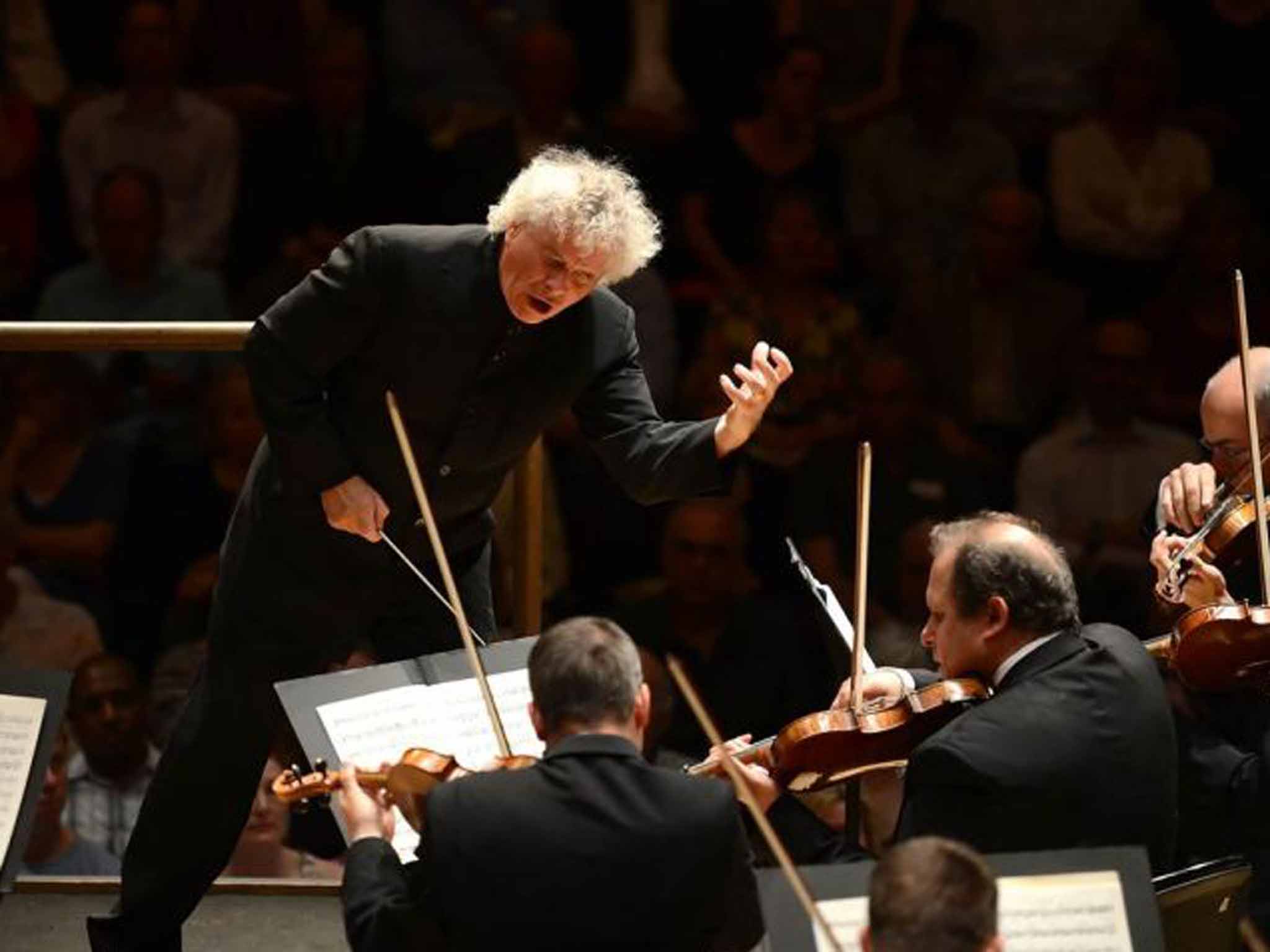Does London need a new concert hall? The virtues of the Barbican Hall have been overlooked
Sir Simon Rattle wants a brand new, acoustically perfect concert hall for London. But Michael Church watched him perform at the Barbican on Sunday and the sound was flawless

From now on, every time Simon Rattle raises his baton at the Barbican, he will offer a hostage to fortune: the more musically successful the concert, the shakier will seem his argument that the Barbican Hall needs to be replaced by something infinitely grander, with state-of-the-art acoustics.
Last Sunday, Peter Sellars' semi-staged production of Pelléas et Mélisande at the Barbican – with Rattle on the podium – was outstandingly successful. Quarter-staged would be more accurate, since the only props apart from lighting were two bed-sized platforms around which the orchestra was thickly ranged. Sellars' idea was that the violins should be the forest in which the characters lost themselves, but the drama he extracted from his cast was grippingly theatrical.
Singing under her husband's beat just three feet away, Magdalena Kozena made such a feisty Mélisande that the usual balance of the love-triangle was completely reset. She exuded hungry sexuality in her initial encounters with Golaud and his brother Pelléas, and as her pregnancy swelled she brought to mind a love-satiated figure in a Pre-Raphaelite painting; she fought tigerishly with Golaud before his mortal blow.
The performances of the rest of the cast were no less impressive: Christian Gerhaher as a driven but diffident Pelléas, Gerald Finley bringing desperate vulnerability to Golaud, and Franz-Josef Selig as a sweet, world-weary Arkel. Bernarda Fink's Geneviève was a compelling presence, while young Elias Mädler, as Golaud's reluctant spy, sang with warm-toned expressiveness.
To check out the acoustic question, I sat at the back of the stalls and scarcely missed a word; the London Symphony Orchestra were on top form, and the detail in their playing emerged with brilliant clarity. OK, if they had been playing in Birmingham's Symphony Hall – built to satisfy the demands of the CBSO's then music-director Simon Rattle – the sound would have been even more pellucid. But here one had no sense of acoustic deprivation.
There has recently been much talk about a new Centre for Music, a proposed replacement for the Barbican Hall, whose champions – egged on by those lovers of flashy grands projets George Osborne and Boris Johnson – are pushing ahead with their plans. It has been plausibly alleged – and only half-heartedly denied – that the prospect of this new auditorium was the carrot to entice Rattle back home, but its scope extends far beyond acoustics.
Concert-hall technology can now do wonderful things, and this hall would do many of them: infinitely flexible in how audience and performers would interact, every seat equipped with the latest digital bells and whistles. Listeners at the centre would apparently have “touchscreens offering programme information and social media content before and after the performance, enhancing the concert and creating communities of interest among the audience” – all of which sounds as much a threat as a promise for those whose interest is the music itself.
More seriously, under pressure from this shock of the new, the virtues of the Barbican Hall itself have been overlooked. Yes, it always was a pretty dreadful building, but history has conferred on it patina and spirit, as it did with the old Sadler's Wells building, and such things are important – they warm the heart.
News that the proposed “repurposing” of this building will turn it into “a home for innovative and popular contemporary music” prompts memories of all the things it has been host to: the piano and song recitals, the superb Purcell and Monteverdi operas, the great visiting orchestras and the maverick experimentalists – none of whom have been discernibly hampered by acoustic problems. Rattle may disingenuously declare that London “deserves a great concert hall”, but in the Barbican and the Royal Festival Hall – imperfect as they are – it already has two.
Yet the bandwagon for the new centre is rolling fast. Likened to a Tate Modern for music, it's being touted as a “beacon” for what the feasibility plan rather implausibly dubs the City's new Cultural Hub (the Museum of London and St Paul's being the other elements). And it would (in theory) spread its benign influence, via virtual reality, to every corner of the land.
But behind this virtuous talk of outreach lies a hard calculation. Its projected cost of £278m (generally reckoned to be nearer £400m) would be City money, and what the City wants is a prestige project to rival the shining new Philharmonie de Paris: that prospect is what will release the dosh.
If this were public money, everyone would have the right to argue how it was spent: disbursed throughout the regions, £400m could utterly transform Britain's musical life. But if the project goes ahead – and this new auditorium may indeed be magnificent – there should certainly be a proviso insofar as public money is involved. Public funders should insist that it supports, rather than undermines, London's precarious musical ecosystem: the other London orchestras must not be damaged by LSO dominance.
Meanwhile, many of us will increasingly treasure our trips to the Barbican – in its un-repurposed state.
Join our commenting forum
Join thought-provoking conversations, follow other Independent readers and see their replies
Comments
Bookmark popover
Removed from bookmarks